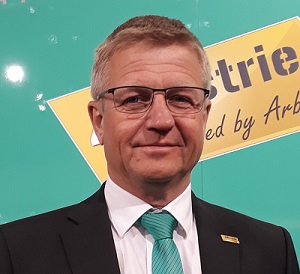With its "Wir sind da." brand promise, Arburg focused on Industry 4.0 and additive manufacturing, as well as innovative lightweight construction for the automotive industry, LSR processing for the 3Cs sector (communication, computer, consumer), a medical technology application and an ambitious turnkey solution for the packaging industry at the recently-concluded Chinaplas 2018.
"In this major exhibition, Arburg brings its expertise in turnkey solutions for various needs of fast-growing sectors. As a leading machine manufacturer and technology partner, Arburg demonstrates how we can help our customers achieve the highest productivity," according to Arburg Managing Director-Sales, Gerhard Böhm. At Chinaplas 2018, Arburg occupied a bigger space to present live demonstrations its machines.
With over 30 years of experience in digitally networked machines including peripheral equipment, Arburg has excelled in digital transformation. From the smart machine and host computer system to the Smart Factory and Smart Services, the company offers everything a 'smart' injection moulding company needs to enhance added value in networked and flexibly automated production, production efficiency and process reliability. As a central component of Industry 4.0, the Arburg host computer system (ALS) enables complete traceability of orders, batches and individual parts. Machines and peripheral components can thus be networked in a simple, standardised way by means of interfaces based on the OPC UA application protocol. All exhibits on the Arburg stand are automated and connected to ALS.
Sophisticated turnkey system was also demonstrated producing folding crates for the packaging industry: a hydraulic Allrounder 920 S with a clamping force of 5,000 kN and a 1 + 2 + 2-cavity family mould first produced five individual PP parts in a cycle time of 32 seconds. A Multilift V 40 linear robotic system with a load capacity of 40 kilograms was seen removing all moulded parts simultaneously and positioned them in a separate assembly station. There, the 950 gram end product was automatically assembled within the injection moulding cycle and the ready-to-use folding crate (40 x 30 x 15 centimetres) was placed on a conveyor belt by the Multilift V 40.

Mr. Gerhard Böhm, Arburg Managing Director-Sales
For the automotive sector, lightweight parts are of interest to many industries and for the firs time, Arburg presented the ProFoam physical foaming technology in China. Aside from reducing weight, the technology can also be used specifically to improve mechanical characteristics and part quality. The innovative process can be used on conventional injection moulding machines.
In addition, the medical sector is Arburg's important market that it demonstrated the modular Allrounder which can be precisely tailored to customers' requirements. The range extends from machines and production cells that are docked to a clean room from the outside to a machine or turnkey system in the clean room itself. An Allrounder 370 E Golden Electric was used to demonstrate that the entry-level electric series is also suitable for the precise production of medical technology parts. The exhibit used a 2-cavity mould from Wellmei to produce Y connectors for intravenous drip therapy. The moulded parts made from PC were removed and set down by a Multilift Select linear robotic system.
Arburg is a pioneer in the processing of liquid silicone (LSR) and demonstrated its competence at the Chinaplas 2018 with a machine designed for LSR processing from the Golden Edition entry-level series: an Allrounder 420 C Golden Edition produced flexible LSR cases for the iPhone 8. The mould is provided by Prover, while the LSR dosing unit comes from 2 KM. A Multilift Select linear robotic system performs the handling tasks.
A Freeformer and a variety of functional components were used at the exhibition to demonstrate that Arburg Plastic Freeforming (APF) is not only suitable for prototyping but also for the industrial additive manufacturing of functional components in particular. The exhibit processed qualified standard PP and the water-soluble support material Armat 12 to produce functional cable clips with delicate yet durable structures.
"We see two different demands in China: one comes from global companies operating in China in which we have good relationship; the other comes from the growing number of Chinese companies in the market having higher demand for quality and efficient production systems,"according to Mr. Böhm.
Currently, Arburg operates two locations in China but the company is strengthening its presence in the ASEAN region especially for the packaing industry. Arburg China's first-class range of services includes fast, competent service, both at local level and over the phone. In addition, a broad range of training courses relating to machines, application technology and service are provided in the local language. The team in China is growing continuously, particularly in service and after-sales. Arburg also sees rising demand for its turnkey solutions in the ASEAN region and intends to boost its presence in this region.














